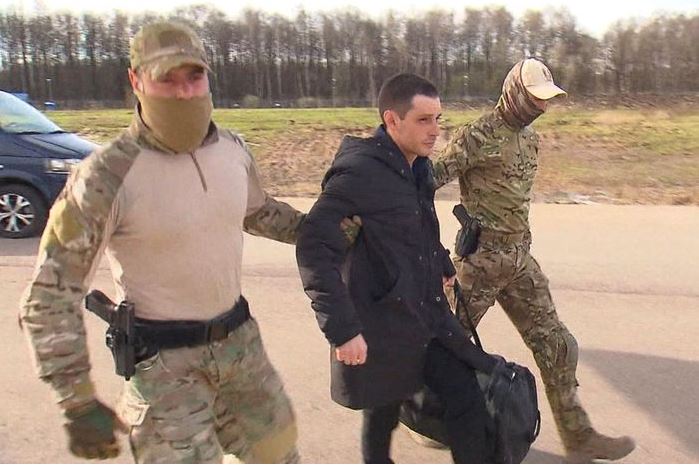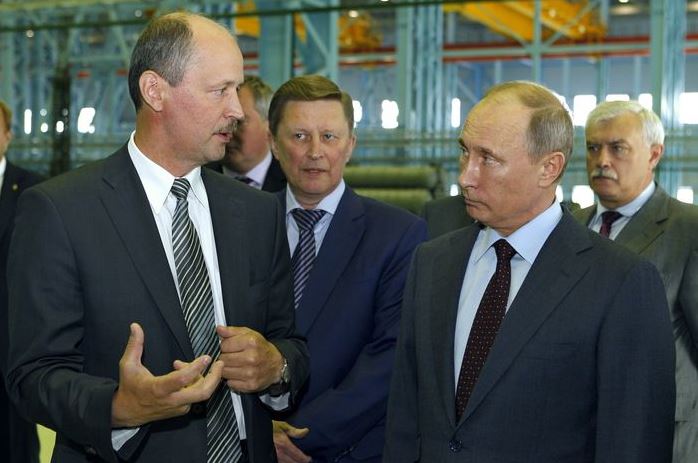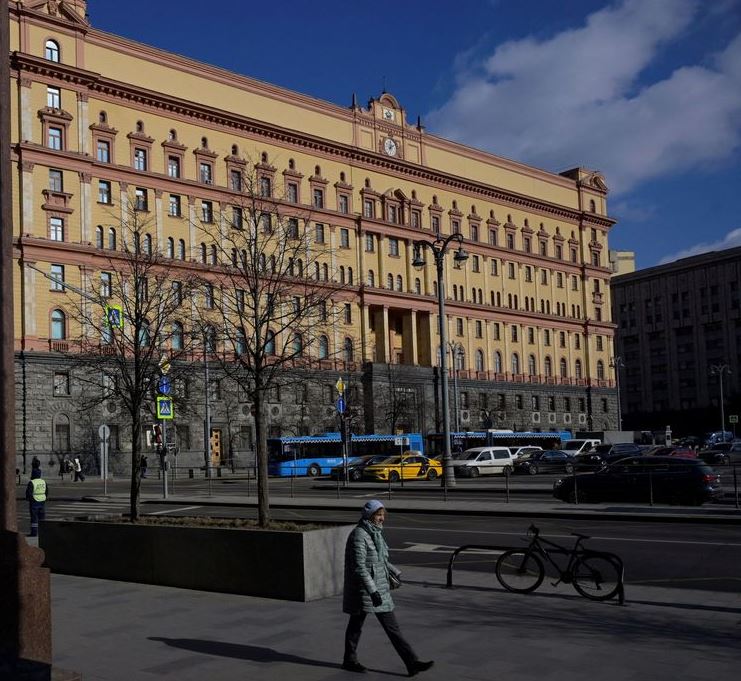A clandestine unit of Russia’s Federal Security Service known as the Department for Counterintelligence Operations, or DKRO is notoriously feared to be behind a string of movie-like operations targeting foreigners especially Americans and diplomats.
The DKRO is the counterintelligence arm of the FSB responsible for monitoring foreigners in Russia, with its first section, or DKRO-1, the subdivision responsible for Americans and Canadians.
“The DKRO never misses an opportunity if it presents itself against the U.S., the main enemy,” said Andrei Soldatov, a Russian security analyst who has spent years studying the unit. “They are the crème-de-la-crème of the FSB.”
“They’re very, very smart on the America target. They’ve been doing this a long time. They know us extremely well,” said Dan Hoffman, a former Central Intelligence Agency station chief in Moscow, about DKRO. “They do their job extremely well, they’re ruthless about doing their job, and they’re not constrained by any resources.”
Since the early years of his presidency, Russian leader Vladimir Putin has used DKRO to track American journalists, placing or recruiting Russian informants in their bureaus and receiving detailed memos about their reporting, according to U.S. officials and documents published by the security analyst, Soldatov.
On March 29, 2023, DKRO officers led an operation and arrested a Wall Street Journal reporter Evan Gershkovich, becoming the first American reporter held on espionage charges in Russia since the Cold War.
President Vladimir Putin received video briefings before and after the arrest from Vladislav Menshchikov, head of the FSB’s counterintelligence service, which oversees DKRO, according to Western officials and a former Russian security officer.
During the meeting, Putin asked for details about the operation to detain Gershkovich.
DKRO also led the operation to arrest Whelan, in what U.S. officials, the former Marine’s lawyers and his family have said was an entrapment ploy involving a thumb-drive. The U.S. also considers him wrongfully detained.
When Moscow police held Reed, another former Marine, after a drunken night with friends, then claimed he had assaulted a policeman, officers from DKRO took over the case, according to the U.S. officials and Reed.

Reed denied the assault and has said Russian law enforcement provided no credible evidence it had taken place. He was given a nine-year sentence, and eventually swapped for a Russian pilot in U.S. custody.
U.S. officials blame DKRO for cutting the power to the residence of current U.S. Ambassador to Moscow Lynne Tracy the night after her first meeting with Russian officials in January, and for trailing an embassy official’s car with a low-flying helicopter.
U.S. diplomats routinely come home to find bookcases shifted around and jewelry missing, for which they have blamed DKRO officers.
More recently, a Russian drone followed a diplomat’s wife as she drove back to the embassy, unaware that the roof of her car had been defaced with tape in the shape of the letter Z, a Russian pro-war symbol.
U.S. officials say they believe the group was behind that. U.S. officials strongly believe that the Russian police posted around Washington’s embassy in Moscow are DKRO officers in disguise.
American diplomats posted to Russia receive special training to avoid DKRO and other officers from the FSB and are given a set of guidelines informally known as “Moscow Rules.”
It was updated recently to reflect the security services’ increasingly aggressive posture. One important rule, say the officials who helped craft it: “There are no coincidences.”
In May 2023, the spy agency arrested a former U.S. consulate employee, Robert Shonov, and charged him with collaboration on a confidential basis with a foreign state or international or foreign organization.
At the time of his arrest, the Russian national was working as a contractor to summarize newspaper articles for the State Department, which called the arrangement legal and the allegations against him “wholly without merit.” Like Gershkovich, Shonov is now in Moscow’s Lefortovo prison.
“Today, the FSB is incredibly powerful and unaccountable,” said Boris Bondarev, a Russian diplomat who resigned and went into hiding shortly after the invasion of Ukraine.
“Anyone can designate someone else as a foreign spy in order to get promoted. If you are an FSB officer and you want a quick promotion, you find some spies,” Bondarev alleges.
DKRO officers occupy a privileged position within the security services and Russian society. Its predecessor was the so-called American Department of the KGB, formed in 1983 by a hero of Putin, Yuri Andropov, the longtime security chief who became Soviet leader.
The unit’s officers are well-paid by Russian standards, receiving bonuses for successful operations, access to low-cost mortgages, stipends for unemployed spouses, preferential access to beachside resort towns and medical care at FSB clinics that are among Russia’s best.

The Federal Security Service (FSB)
The Federal Security Service of the Russian Federation is the principal security agency of Russia and the main successor agency to the Soviet Union’s KGB; its immediate predecessor was the Federal Counterintelligence Service which was reorganized into the FSB in 1995.
In April 2023, Russia passed new treason legislation that further empowered the FSB to squelch criticism of the war. In May, the spy agency, using wartime powers, said it would start to search homes without a court’s approval.
Putin has publicly berated his spy agencies several times since late 2022, after his so-called special military operation fell short of his expectations. Around that time, U.S. officials noticed an uptick in aggressive actions toward the few Americans still in Russia.
“You need to significantly improve your work,” Putin told FSB leaders in a December speech to mark Security Agents Worker’s Day, a Russian holiday. “It is necessary to put a firm stop to the activities of foreign special services, and to promptly identify traitors, spies and diversionists.”
He repeated the admonishment during a visit to Lubyanka, the FSB headquarters, a month before Gershkovich’s arrest.
Putin spokesman Dmitry Peskov in April denied that Putin had a role in authorizing the arrest. “It is not the president’s prerogative. The security services do that,” he said. “They are doing their job.”
Putin likes to be personally briefed on the FSB’s surveillance of Western reporters, said U.S. and former Russian officials. Leaked FSB documents from previous surveillance cases against foreign reporters show agency leaders along the chain of command adding penciled notes in the margins of formal memos, so that higher-ups can erase any comments that might upset the president.
DKRO memos often begin with greetings punctuated by exclamation marks to indicate urgency and militaristic formality—a common style in the Kremlin bureaucracy—followed by meticulous notes about the movements of Westerners in Russia and the locals they meet.
“We ask you to identify an employee of the Ministry of Internal Affairs at his place of employment, interrogate him about the goals and nature of his relations with the British, and as a result, draw a conclusion,” read one 2006 memo reviewed by the Journal.
The FSB has oversight for espionage trials conducted in secret using specialist investigators and judges. During Putin’s 23 years in power, no espionage trial is known to have ended in acquittal.
The First Service, which oversees DKRO, has been led since 2015 by Menshchikov, who previously headed the Kremlin’s Special Programs of the President, which guards secret underground facilities.
Like Putin and many of his top security officials, Menshchikov was born in St. Petersburg. He served as the general director of air defense company Almaz-Antey.
The First Service has assigned Chief Investigator Alexei Khizhnyak, an agency veteran who led the case against Whelan, to investigate Gershkovich, according to televised court proceedings.
Russian lawyers who have worked on cases involving Khizhnyak, but who aren’t involved in Gershkovich’s, described a heavyset interrogator who sits behind an L-shaped desk next to bookshelves filled with legal documents.
Khizhnyak would alternate between threats and long philosophical discussions of Russian literature, according to one of these lawyers. A person interrogated by him years ago described him as an astute and careful questioner, difficult to fool.
Alexander Zhomov, who led DKRO after the breakup of the Soviet Union, was a familiar face to the CIA, which had once dubbed him “Agent Prologue.”
Zhomov had fooled the U.S. spy agency into believing he was a defector in the late 1980s by claiming to provide detailed information about the KGB’s monitoring of CIA officers in Moscow.
In reality, he was a double agent leading the KGB’s “Operation Phantom” to distract the American spy hunters from finding longtime Russian moles—Aldrich Ames at the CIA and Robert Hanssen at the FBI.
After President Boris Yeltsin split the KGB into smaller, less powerful services, including the current FSB, Zhomov found work at the new DKRO, created in 1998, as it surveyed the 1990s influx of American investors, reporters and visitors.
Zhomov was promoted to head the unit around the time a new director arrived: Putin.
In December 2018, DKRO officers arrested former US Marine Paul Whelan, accused of espionage.
Whelan, who had traveled regularly to Russia for his work in corporate security, after he was handed a thumb drive his lawyer said he thought held photos of Russian churches. Russia said it contained state secrets.
Whelan, who has denied the charges, was convicted of espionage in 2020 and sentenced to 16 years. Shortly after Whelan’s arrest, Russian officials told U.S. officials in Moscow they would be interested in a prisoner swap.
In 2019, Reed, the former Marine, was arrested after a drunken evening with friends in Moscow. After first being told he could leave the police station, two counterintelligence officers who he believed were from DKRO arrived to question him, according to Reed. The officers focused on his military background, he said, but failed to discern that he had top security clearances.
“They clearly wanted to assess if I was anyone with valuable intel,” he said. Reed was swapped in April 2022 for Konstantin Yaroshenko, a Russian pilot sentenced in 2011 to 20 years in prison for conspiracy to smuggle cocaine into the U.S. “Knowing I was a Marine was enough to decide to use me as a hostage,” said Reed.




















